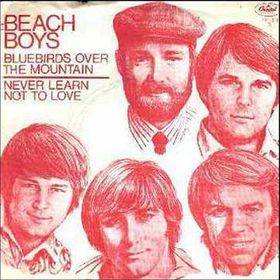THE NIGHT THAT the four members of the infamous Manson Family drove out to a secluded Benedict Canyon mansion and brutally butchered Sharon Tate, Abigail Folger, Voytek Frykowski, Jay Sebring, and Steven Parent, they did more than strike a blow for Helter Skelter (Manson’s name for the Apocalypse that would occur when alarmed whites would rise up against the blacks), they fulfilled the fantasy of every frustrated would-be musician who had been given the cold shoulder by “the man.”
For while the California mansion that used to stand at 10050 Cielo Drive (now bulldozed to the ground) was the current residence of Ms Tate, it actually belonged to music mogul Terry Melcher. He had moved out about a month earlier, and was a man with whom Charles Manson held a powerful grudge.
Terry Melcher (the son of perky pop icon Doris Day) was a key player on the late ‘60s LA music scene. In the early 60s he’d ridden the surf music craze with the Rip Chords, who had had a hit with ‘Hey Little Cobra’. Later he wrote songs with the likes of Bobby Darin and Randy Newman. He was then hired as a staff producer at Columbia Records, where he took the folksy Byrds under his wing and helped them score an unlikely pop hit with Pete Seegers’ song ‘Turn! Turn! Turn!’ Melcher’s golden touch later extended to bands like Paul Revere and the Raiders, the Rising Sons (with Taj Mahal and Ry Cooder), Glen Campbell and future Beach Boy Bruce Johnston (who had been in the Rip Chords with Melcher). It’s the Beach Boys connection that later proved to be the important one.
In 1968, Melcher was introduced to a charismatic wannabe-rock-star named Charlie Manson by his pal, Beach Boy drummer Dennis Wilson. Charlie had arrived in Southern California in 1967, and had somehow managed to worm his way into the burgeoning SoCal music scene, hanging with the likes of Wilson and Neil Young, Manson wanted to interest Melcher in financing a film idea of his that would feature his music. At Wilson’s urging, Melcher (with writer/producer Gregg Jakobson) subsequently made several demos with Manson. Charlie was pleased, but Melcher found the music too stark and dark, and he was not especially interested in recording any more of it. What he didn’t realize at the time was that Manson had built this recording opportunity with Melcher into something very real in his mind–his big break–so when nothing more came of it Charlie was plenty angry and he blamed Melcher for his failure as a rock star.
Curiously, of all possible people, it was the endless-summer ultimate mellow-fellow Wilson who was especially drawn to Charlie’s dark songs. He championed Manson’s cause to anyone who would listen and he began a relentless campaign to sign Manson to Brother Records, the Beach Boys’ new imprint. But try as he might, the other Boys in the band picked up some bad vibrations from Charlie and the deal fell through. They did, however, record one of Charlie’s songs called ‘Cease To Exist’ for their 20/20 album (although they re-titled it ‘Never Learn Not To Love’ and credited it to Dennis Wilson).
Far from being pleased by this, Manson was pissed. He claimed that the Beach Boys used his song without paying him. Eventually he worked out a deal with Wilson: the song for a Rolls-Royce. “What are you going to give me for that song?” Manson asked. “I’ll give you this Silver Cloud,” Wilson replied. According to Manson, when he asked Wilson for the pink slip all he got in return was a slippery answer. “I’ve got to get it from my business manager. It’s in the company’s name,” was Wilson’s stock reply. Manson eventually asked the business manager when he was going to get paid and received vague threats in return. “They owed me that car,” Manson is quoted as saying. “But they didn’t want to pay me.”

